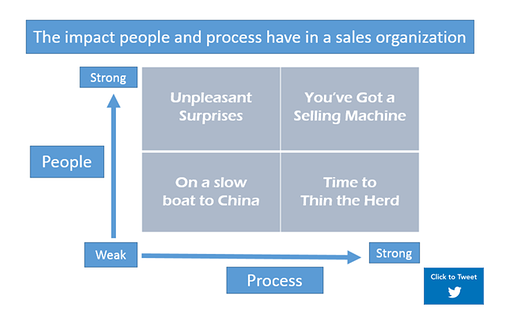Does your company have a strong sales process? Most small businesses don’t because often times the leader, the entrepreneur-CEO, has exceptional talents in some kind of technical background but doesn’t understand how to build a sales organization...and frequently doesn’t have the interest to create one. This article is about how your sales process can impact your people and the effectiveness on your sales organization.
Edwards Deming, considered one of the smartest business minds of our time, states “a bad system will beat a good person every time.” When problems occur in the workplace, it is more often a bad process at fault than a bad person. This concept holds true in a sales organization, but the dynamics are a bit different.
To achieve sales success, you must have the right people operating in the right sales process. The sales “process” in this context is a combination of, but not exclusive to, the following things
- An environment in which people are encouraged to excel
- Proven lead generation activities
- Products and services that appeal to the target market
- Knowledge about how your products and services benefit your target market
- Incentive compensation plans and sales quotas that make sense
When you factor people into the process, you get the following dynamics
This matrix illustrates how people and process combine to create different dynamics. Naturally, strong people in a strong sales process will achieve success. When you’ve put weak people into a weak sales process, you’re really just wasting your time before you run out of money, get angry or do whatever you do when things don’t go your way.
When you’ve put strong people into a weak sales process, you’ll probably get some success but it is very possible those good people won’t hang around, and you’ll get that unpleasant surprise of a great person deciding to work somewhere else.
The most challenging situation is when you have a weak person in a strong process. Depending on how much training, development and coaching you’ve invested in the person, it may be appropriate to continue to invest in that person’s success, or it may be time to “thin the herd” so to speak and find a replacement.
What’s more important – people or process?
So, which is more important, people or process, and what should you prioritize. I’ll go back to the Deming quote and say “process” is the priority. Why? Because if you create a good sales process in your organization and you continue to invest in it, it will have longevity. You may not get the sales results you seek, but you’ll have a strong process and you just need to find the right people to put into it.
On the contrary, if you just go out and find strong sales people, and you put them into a weak sales process, it is likely you’ll get a lot of experience hiring strong salespeople because they may not stay long with you. I’ll argue that it is harder and more time consuming to find great salespeople than it is to implement a strong sales process.
Salespeople DNA
Even though process trumps people in most instances, sales is a bit unique. Unlike many other non-technical roles, your sales people have to possess a high sales compatibility. Sales has to be in their DNA. If they don’t have the attributes proven to align with compatibility in a sales position, a good process will likely result in a mediocre sales performance.
It is difficult to assess sales compatibility during an interview process, and we suggest using pre-employment assessment instruments to test for compatibility in sales.
In summary, evaluate the strength of your sales process – the environment, tools and resources that make up your sales organization. Then, evaluate the sales compatibility of your salespeople to determine if they have what it takes to excel.






Agree, disagree, or just have something to add?
Leave a comment below.